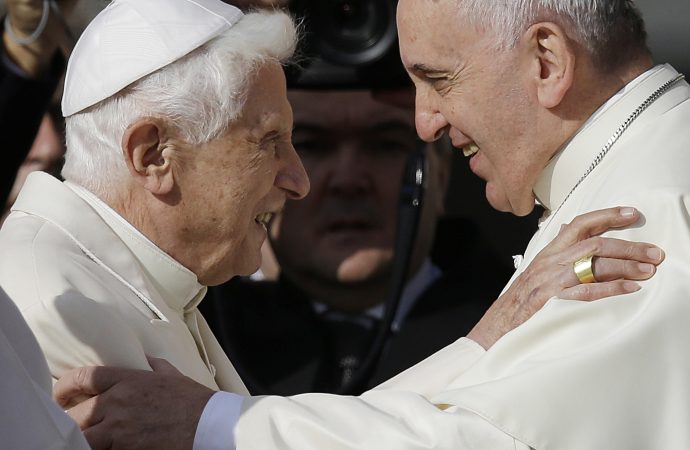Both Pope Francis and retired Pope Benedict XVI have praised a symposium happening this week in Rome exploring human rights, saying there has been a breakdown of the idea of a right, putting the development of humanity at risk.
In a letter signed Nov. 12 and addressed to Jesuit Father Federico Lombardi, president of the Joseph Ratzinger-Benedict XVI Foundation, Benedict offered praise for the Nov. 15-16 symposium the foundation is organizing on “Fundamental Rights and Conflicts Among Rights.”
Calling the initiative “extraordinarily useful,” Benedict said the most important topic up for discussion, in his view, is “the problem of the ‘multiplication of rights’ and the risk ‘of the destruction of the idea of a right.’”
This, he said, “is a current and fundamental question for the protection of the basis of the coexistence of the human family, which merits to be placed again as a topic of deep and systematic reflection.”
Benedict assured the speakers and participants of the conference of his respect and closeness in prayer, asking God to bless their work as “a precious service for the Church and for the good of the human family.”
In a Nov. 13 letter also addressed to Lombardi, and which was published Nov. 15 alongside Benedict’s letter, Pope Francis noted how the 70th anniversary of the December 1948 United Nations Declaration on Human Rights is approaching.
He said the date is an opportunity to celebrate not only the signing of the declaration, but to reflect on the “the development of the vision of human rights in the modern world.”
Over the years, “the interpretation of some rights has progressively been modified, to the point of including a multiplicity of ‘new rights,’ not infrequently in contradiction with one another,” he said, adding that this development has lead to numerous problems with the idea of a right, including fundamental rights.
Speaking of his predecessor, Francis said Benedict XVI recognized the “urgency” of these changes and intervened as both “a thinker and a pastor,” receiving an honorary doctorate in jurisprudence from LUMSA University when he was still a cardinal in 1999.
Francis closed his letter voicing hope that the gathering, in drawing on “the thought and the magisterium” of Benedict XVI’s papacy, would contribute “with courage and depth to shed light on an essential problem for the protection of the dignity of the human person and their integral development.”
Taking place at the Rome campus for LUMSA University, the symposium has drawn participation from experts in academia and legal fields from around the world to discuss the state of human rights in the current global climate, including Princeton Professor Robert George, Harvard Professor Mary Ann Glendon, and New York University Professor Joseph Halevi H. Weiler.
Also among the speakers who opened the meeting was Professor Giuseppe Dalla Torre, president of the tribunal of the Vatican City State and a consulter to several Vatican departments. He served as rector of Rome’s LUMSA University from 1991-2014, and currently teaches there as a professor of jurisprudence, economy, politics and modern languages.
In comments to Crux earlier this week, Dalla Torre, who gave a keynote address to the symposium on religious freedom as the foundation of human rights, spoke about the problem of the “multiplication of rights,” and the breakdown of the concept of a right altogether, saying the latter is a result of the former.
He said there is currently a “conflict of rights” in Western societies which is seen first of all in a confusion between basic “fundamental rights,” such as the right to life and freedom, and “common rights,” such as a right to free speech or freedom of the press.
A “plurality of rights” has developed, he said, in which society claims as inherent human rights things that contradict one another, such as “the right to life and the right to abortion.”
“Contemporary society, especially Western society, which is a secularized, individualist, relativist society, tends to claim them not as rights, but a right as a fundamental right … the property of their desires,” Dalla Torre said, explaining that this then “collides with the rights of others.”
The subsequent clash risks bringing about “the destruction of the idea of a right” altogether, he said, because, “if everything is a right, if my desire becomes a right, then obviously the idea of a right” is devalued.
While there’s a need to push for human rights in some areas of the world, “the problem is that if we put them all at the level of a fundamental right - those expectations that must be recognized by all men in every part of the world, in every moment of history - the risk is their banalization, their erosion.”
When this happens, goal of a fundamental right in itself disappears, he said, adding that this “is typical of the Western world. A world that has passed through processes of secularization, of laïcité, of relativism, of individualism, where everyone tries to affirm themselves.”
In his speech at the conference, Dalla Torre, who awarded Benedict XVI his honorary law degree from LUMSA, praised him “for the fundamental contribution that his thought has brought to the certain, secure, foundation of law even more than human rights,” and spoke of the concept of law, rights and religious freedom in modern global society.

